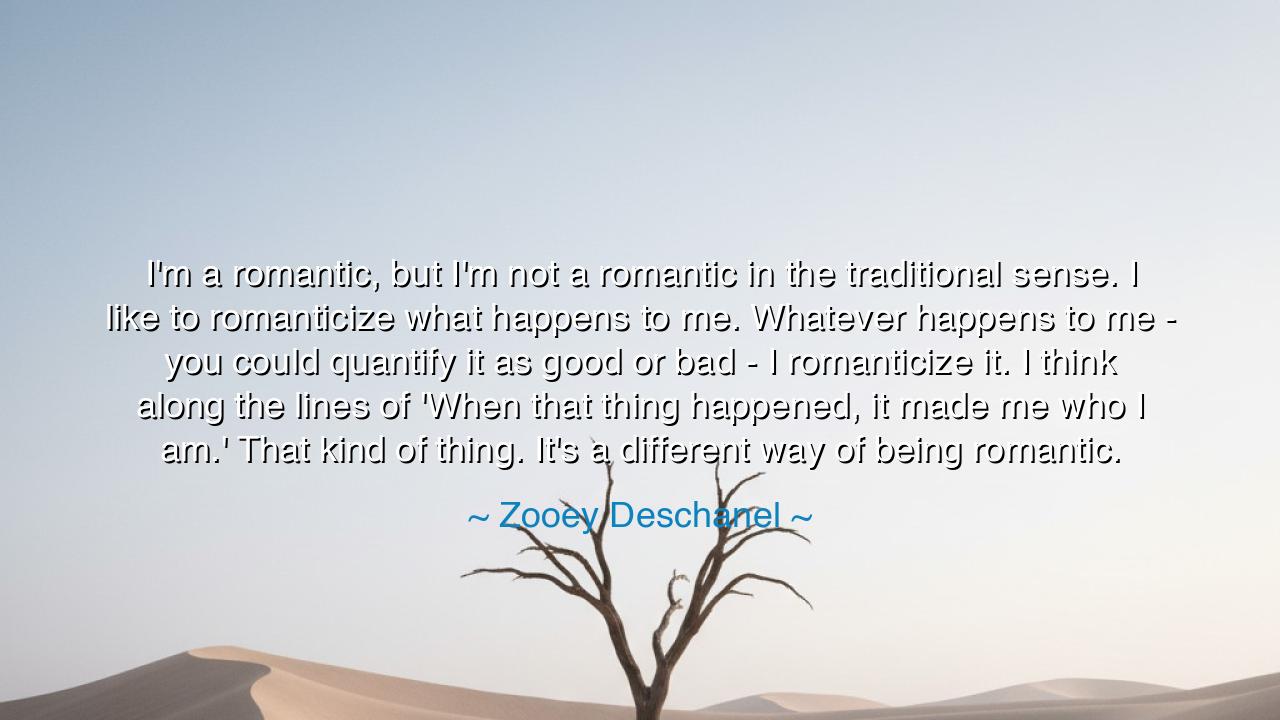
I'm a romantic, but I'm not a romantic in the traditional sense.
I'm a romantic, but I'm not a romantic in the traditional sense. I like to romanticize what happens to me. Whatever happens to me - you could quantify it as good or bad - I romanticize it. I think along the lines of 'When that thing happened, it made me who I am.' That kind of thing. It's a different way of being romantic.






The words of Zooey Deschanel—“I’m a romantic, but I’m not a romantic in the traditional sense. I like to romanticize what happens to me. Whatever happens to me—you could quantify it as good or bad—I romanticize it. I think along the lines of ‘When that thing happened, it made me who I am.’ That kind of thing. It’s a different way of being romantic.”—reveal a vision of life that transforms every moment into meaning. She speaks not of the fleeting sweetness of roses and candlelight, nor of love stories written in the stars, but of the deeper romanticism that sees life itself as a tapestry of significance. For her, to be romantic is to take every experience—joy or sorrow—and weave it into the great story of the self.
This is a different way of being romantic, for it does not cling to illusions, but reimagines reality. Where others see misfortune, she sees transformation. Where others measure by success or failure, she measures by growth. To romanticize her experiences is not to deny pain or diminish joy, but to frame them as chapters in a greater narrative. In this way, she embodies the ancient wisdom of poets and philosophers who taught that the meaning of life lies not in what happens to us, but in how we choose to interpret it.
This view echoes the spirit of Marcus Aurelius, the Stoic emperor. In his Meditations, he recorded the trials of war, betrayal, and illness, yet he sought to interpret each event as part of his formation, as a stone in the architecture of his soul. Though he was no romantic in the traditional sense, his reflections resemble Deschanel’s vision: to look back and say, “When that thing happened, it made me who I am.” Her approach is the union of Stoic strength and Romantic imagination—taking the raw material of life and turning it into beauty.
Consider also the story of Helen Keller, who, though struck with blindness and deafness in childhood, later wrote of her life not as a tragedy but as a journey into light. She romanticized her struggles, not by pretending they were pleasant, but by declaring that they gave her wisdom, resilience, and vision beyond the physical. Through this lens, her hardships became not curses but gifts. In the same way, Deschanel’s words remind us that even the harshest trials can be reframed as necessary fires through which character is forged.
The meaning of her statement is that romance need not be confined to flowers and lovers—it can be a way of seeing life. To romanticize the self is to turn one’s story into art, to see every scar as part of a heroic journey, every disappointment as the prologue to a new triumph. This does not deny the reality of pain but ennobles it, transforming bitterness into wisdom, and chaos into poetry. Such a way of being keeps the spirit from despair, for even in loss, one finds meaning.
The lesson is clear: do not abandon romance, but expand it. Do not reserve it only for candlelit nights or fleeting passions. Instead, carry it into every corner of your life. Look upon your trials with the eye of a storyteller, who knows that even suffering enriches the tale. See yourself not as the victim of events but as the hero of a narrative where each moment, good or bad, builds the person you are becoming.
Practically, this means cultivating the discipline of reflection. When something painful happens, pause and ask: What did this give me? How did this shape me? When something joyful happens, see it as a gift written into the story of your life. Keep a journal, tell your own tale, and treat your days as chapters in a book worth writing. By doing so, you will romanticize your existence—not as a fantasy, but as a testimony of meaning and growth.
Thus, Zooey Deschanel teaches us that romance is not only in love stories, but in the way we frame our own lives. To be a romantic in this deeper sense is to honor the truth that nothing is wasted, that every joy and sorrow is part of a greater beauty. And when future generations look back, they will see that those who lived this way did not simply endure life—they transformed it into art.






AAdministratorAdministrator
Welcome, honored guests. Please leave a comment, we will respond soon